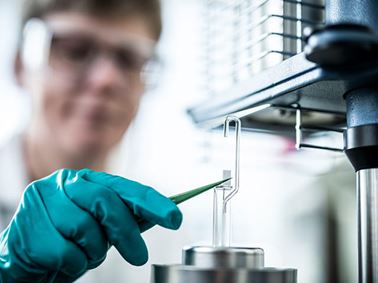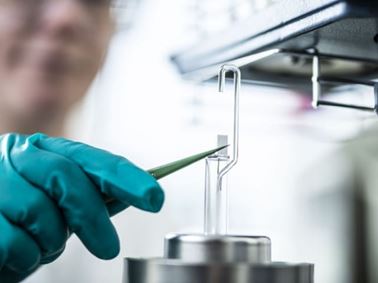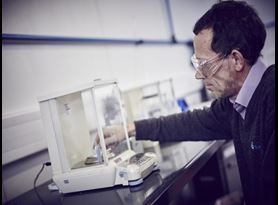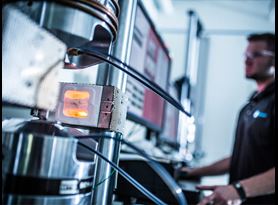Thermal analysis methods measure physical, mechanical, chemical, and thermodynamic changes taking place under differing temperatures and loads, and can pinpoint when and at what temperature significant changes occur. Our thermal analysis services remove uncertainty by identifying important characteristics in your non-metallic materials, help you anticipate changes, and avoid issues before they become failures.
What is thermal analysis method?
Thermal analysis uses a combination of heat and mechanical force to track changes in material structure and helps determine if materials are appropriate for the intended application or use. By using a model of temperature over time, these methods provide accurate data about glass transition temperature (Tg), coefficient of linear thermal expansion (CTE), specific heat, melting temperature, phase transitions, and more.
Thermal analysis methods are also useful for identifying unknown materials, answering questions about the molecular structures of crystalline and amorphous polymers, and aiding in new composite materials research and development.
Why is thermal analysis important?
Plastics and rubbers can be particularly difficult to characterize due to their unique properties. Because of the fluid nature of these materials, understanding their properties is vital. Thermal analysis methods provide insight into how materials can be used and stored.
Thermal analysis methods are also useful for identifying unknown materials, answering questions about the molecular structures of crystalline and amorphous polymers, and aiding in new composite materials research and development.
Thermal analysis services
Element offers highly reliable thermal analysis services, including;
- Thermogravimetric analysis (TGA)
- Differential scanning calorimetry (DSC)
- Dynamic Mechanical Analysis (DMA)
- Thermomechanical Analysis (TMA)
- Heat Deflection Temperature
- Linear Thermal Expansion
Why choose Element?
Our polymer experts have years of experience with thermal analysis and non-metallic materials testing and can assist in choosing the correct method for your project.
Whether you are looking to predict material behavior or improve existing materials, our thermal analysis services provide fast and accurate testing to give you the answers you need.
For more information, or to request a quote, contact an expert today.
Thermal, Physical, and Mechanical Properties of Composite Materials
There is a range of test methods that can help to qualify and quantify the different properties of composite materials, including thermal, mechanical, and physical tests. LEARN MORETesting and Evaluating Thermal Spray Coatings
Mechanical testing on thermal spray coatings is a critical stage in the manufacturing and design process. Verifying the strength and wear resistance of coating formulations allows engineers to verify and develop processes to produce stronger and more effective coatings. LEARN MOREOur Thermal Analysis Services
Element's material testing laboratories offer comprehensive thermal analysis methods.

Differential Scanning Calorimetry (DSC)
DSC is a reliable and cost-effective method for measuring Tg, phase transitions, degree of cure, degree of crystallinity, and more.

Dynamic Mechanical Analysis (DMA)
DMA determines thermal-mechanical properties, such as glass transitions (Tg), by measuring the complex moduli and viscoelastic behavior of materials as a function of cyclic load and temperature.

Thermogravimetric Analysis (TGA)
TGA measures a material's thermophysical and thermochemical properties by measuring the change in specimen mass as a function of temperature and time.

Thermomechanical Analysis (TMA)
TMA provides data on thermal properties by contacting the specimen with a quartz probe to measure CTE and Tg.
Our Materials Testing Services
Related Services

Polymers Testing
Element performs a range of mechanical, electrical, flammability tests and utilizes thermal analysis tests to characterize the composition of polymers and composite materials.

Coatings Testing
We offer world-class materials expertise in polymers, elastomers, thermoplastics, composites, and structural adhesives. With a global reach of coatings laboratories in the UK, USA, Europe, and Asia, Element provides a comprehensive range of coatings testing services to the Energy, Aerospace, Defense, and Transportation sectors.

Ceramic Matrix Composites (CMC) Testing
Our aerospace testing experts help companies characterize their CMC materials and develop their products with the properties needed for lightweight and extreme high-temperature applications.

Local laboratories, global platform
Doing business with one of our laboratories enables our clients' access to our global platform of expertise, capacity and capabilities.

